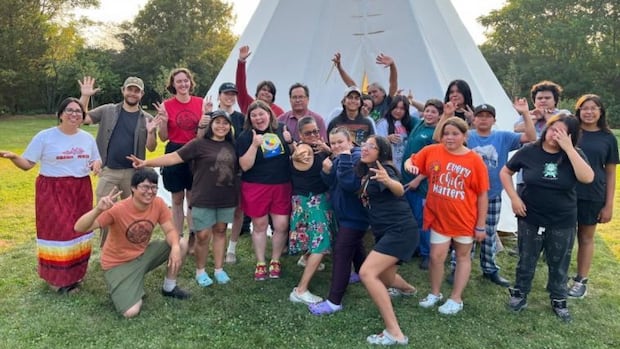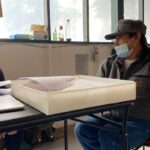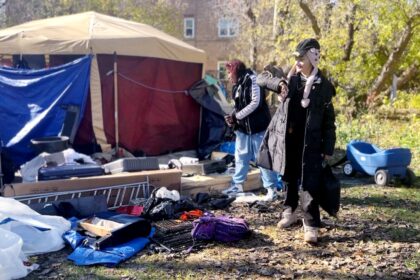Kitchener-Waterloo·VideoA University of Guelph summer camp invited students from three Anishinaabe communities. It gave them a taste of what it could be like to pursue post-secondary education in Guelph while keeping them close to traditional teachings.Summer camp was open to Anishinaabe children between the ages of 11 to 17Aastha Shetty · CBC News · Posted: Aug 21, 2025 7:00 AM EDT | Last Updated: 12 hours agoKids enjoy nature during U of G’s Indigenous Youth Exchange programChildren of all ages from nearby Anishinaabe communities, including Wiikwemkoong Unceded Territory and Magnetawan First Nation, joined a summer camp hosted by the University of Guelph’s research department. The summer camp, organized in partnership with the university and three Anishinaabeg nations, featured a variety of land-based learning opportunities at the University of Guelph’s Arboretum. CBC K-W’s Aastha Shetty dropped by to learn more about the initiative.What is our connection to birds, trees, insects and other living creatures on this planet?Those are the kinds of questions children were asked at an Indigenous Youth Exchange program held at the University of Guelph Arboretum.Last week, children of all ages were invited to attend from three Anishinaabe communities. It gave them a taste of what it could be like to pursue post-secondary education in Guelph while keeping them close to traditional teachings.”This is the most educational yet also fun camp that I’ve been to,” said Jolton Pitawanakwat, a camper from Wiikwemkoong Unceded Territory. “I learned a lot about different types of bugs and invertebrates.”The campers were at the arboretum for about five days starting Aug. 11 and it was open to kids between the ages of 11 to 17. The program was put together through a partnership between the University of Guelph and three Anishinabeg communities: Wiikwemkoong Unceded Territory, Magnetawan First Nation and Shawanaga First Nation.”I’ve been to 20 [camps] within these past two years and this was the most educational,” said Jordie Roy from Wiikwemkoong Unceded Territory, while admiring a fluffy white hickory tussock moth caterpillar crawl over his hands.”[I learned] things that I actually like… I love animals. I love learning.”Kids from three Anishinaabeg communities took part in a one week summer camp at the University of Guelph Arboretum last week. They enjoyed a variety of topics like science, agriculture and athletics. (University of Guelph)Land-based learningCampers learned interesting facts about the world around them and also took part in fun outdoor activities like swimming or hiking.The outdoor classes were guided by a variety of instructors from multiple departments at the University of Guelph, focused on science, athletics and agriculture.Thecla Neganegijig from Wiikwemkoong was one of the two Elders at the camp. She says there were a lot of traditional teachings to take away throughout the week.”Part of it is just to learn that we’re not [the only ones] here on this Earth walk. We’re all connected to Mother Earth and everything here. The trees, the animals, the wildlife, we’re all one because we all belong to this Earth to be able to live,” she said.”It’s a pretty great opportunity to come in, take this trip with the kids to the University of Guelph and check out their nature programs and also for them to check out the university life.”Andrew Young is an entomologist and an assistant professor at the University of Guelph’s school of environmental sciences. He says the youth exchange program started out as a way to give older youth an on-campus experience to help them decide where they want to go to university.”They’re a lot farther from cities and museums and places that have these sorts of resources to get access to [these experiences],” Young said.”Ultimately, the thing that’s different is that I’m learning from the elders and community members… and trying to incorporate that into teaching broadly.”ABOUT THE AUTHORAastha Shetty is a journalist with CBC Kitchener-Waterloo. She has lived, worked and told stories in Waterloo region and surrounding areas since 2018. She has covered a variety of topics including housing and affordability, consumer rights and social injustice. She also has experience as a court reporter and as a multimedia producer. Get in touch: aastha.shetty@cbc.ca or 226 338 7845.
Thursday, 5 Feb 2026
Canada – The Illusion
Search
Have an existing account?
Sign In
© 2022 Foxiz News Network. Ruby Design Company. All Rights Reserved.
You May also Like
- More News:
- history
- Standing Bear Network
- John Gonzalez
- ᐊᔭᐦᑊ ayahp — It happened
- Creation
- Beneath the Water
- Olympic gold medal
- Jim Thorpe
- type O blood
- the bringer of life
- Raven
- Wás’agi
- NoiseCat
- 'Sugarcane'
- The rivers still sing
- ᑲᓂᐸᐏᐟ ᒪᐢᑿ
- ᐅᑳᐤ okâw — We remember
- ᐊᓂᓈᐯᐃᐧᐣ aninâpêwin — Truth
- This is what it means to be human.
- Nokoma











